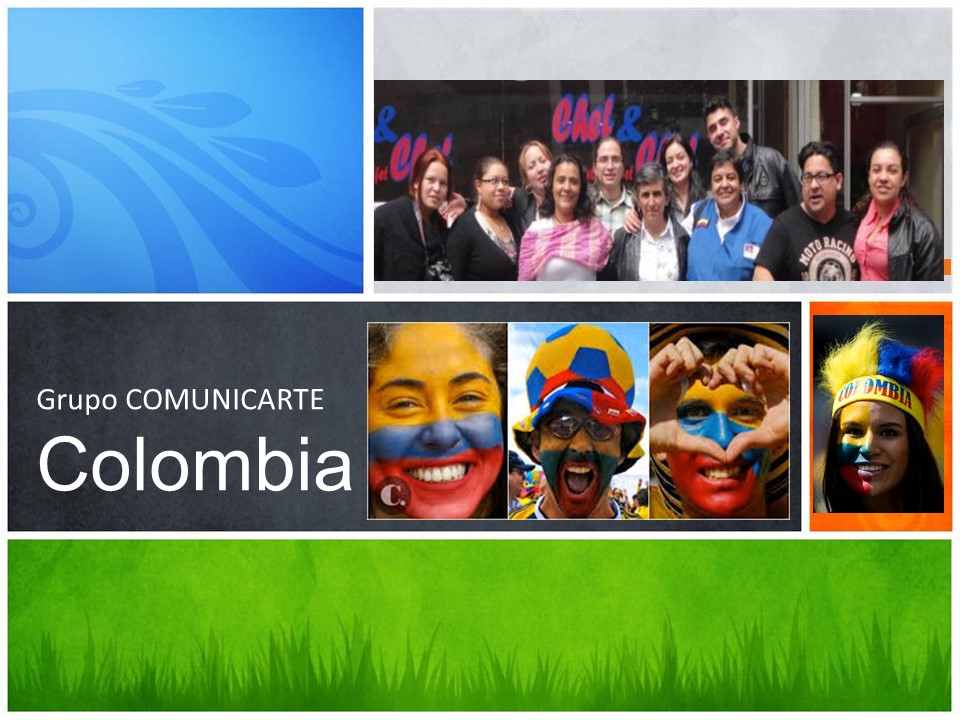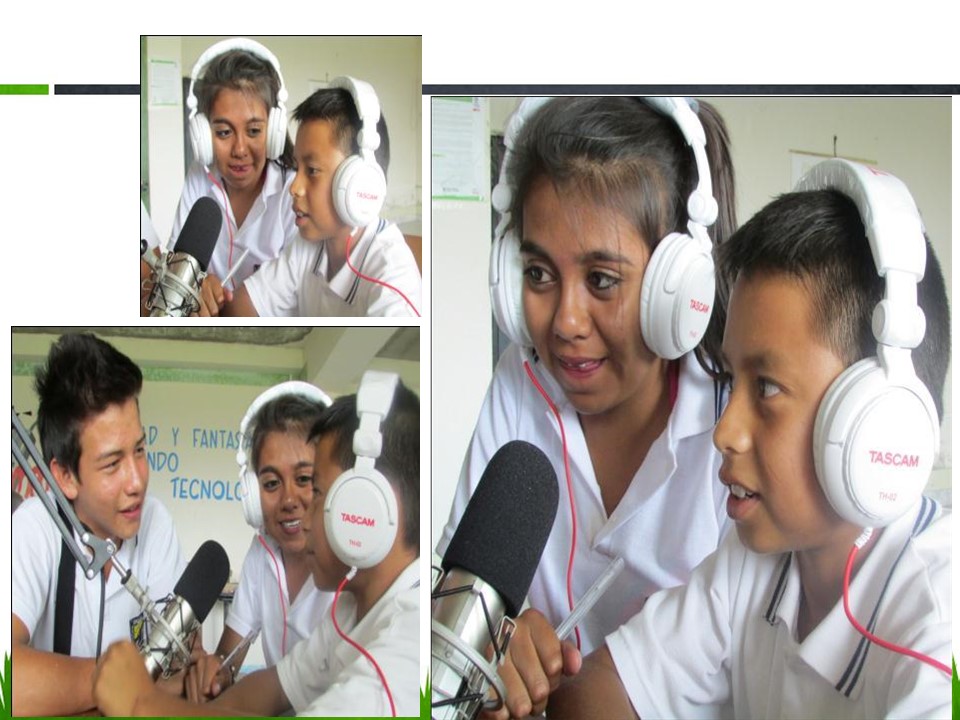Technological Mediation / ADVICE, TRAINING, ACCOMPANIMENT OF EDUCOMUNICATIVE EXPERIENCES IN ICT
4.1 General Objective: Influence a new way of approaching communication and education through advice, training and accompaniment of the various educommunication projects in order to encourage a change in mentality that will promote the improvement of teaching, learning and quality life of the educational communities benefited from the various projects.
4.2 Specific Objectives:
Generate a culture of participation and inclusion for children, adolescents and young people by addressing issues and content from the concerns, needs and experiences of children, adolescents and young people that favors human, social and Christian growth and development and to make the school an inter-learning scenario.
Provide a participatory scenario where topics such as: coexistence, sexual education, values, citizenship, life project are developed
Make communication and the media: Radio, video, multimedia ... a teaching and learning scenario from a participatory dynamic to generate meaningful content
Offer the workshop leaders, teachers, parents and students basic training in the use and appropriation of media, language and audio-visual grammar
Implementation and adaptation of appropriate scenarios such as Communication laboratories, Radio / video Production Centers, Radio and the creation of Radio Production Collectives
The reason has been the way of approaching participatory dynamics where issues that concern children, adolescents and young people are involved, from a participatory and dynamic methodology that breaks with the often dictatorial and vertical schemes of the classes and the contents handled in the school curriculum.
In the various projects carried out, the presence of the Advisory and training for the same workshop leaders was always necessary, who, being professionals, required prior training in methodology, content and planning of the various activities to generate common criteria, policies and different ways of addressing the thematic.
In these training processes it was necessary to train the teachers and directors of the public and private entities benefiting from the projects, to generate innovative dynamics that favored serious educommunicative processes committed to the new generations, where dreams, utopias and demands of the Kingdom of God allow the construction of the social fabric especially in the depressed and marginalized places of Bogotá and some regions of the country.
At the beginning there was a mistrust on the part of the directors and administrators of the schools, As the Education-Communication, media and New Technologies (ICT) projects become widespread, the training without prior training / training of new Talleristas and multipliers training the educommunicative training remains reduced to instrumentalization and technical matter
In this sense, as the Education-Communication, media and New Technologies (ICT) projects become widespread, the training without prior training / training of new workshops and multipliers training the educommunicative training is reduced to instrumentalization and the technical issue
Extra school hours are not valued as new teaching and learning scenarios. The concepts of interparendizaje and of a horizontal, participatory, interactive methodology are still unknown. The educommunicative is reduced only to work clearly in the classroom and to school experiences…. or institutional
The issue of time is a serious problem because the principals do not want to give time to teachers and students, and if they have not participated in the motivation it is more difficult to understand these processes, on the other hand not all teachers who are not in the training processes understand the dynamics, therefore they become the enemies of the process
It is found that the purpose and objective of the training and training among students changes radically when they are included in the curricular networks with a NOTE and with a grade, because it becomes a mandatory and compliance issue.
Many schools continue to handle vertical and dictatorial dynamics in the classes, that is, there is no change in the methodology and a participatory and horizontal pedagogy
DESCRIPTION OF THE EXPERIENCE
This experience that has started for more than 18 years, has been a response to requests for advice, training and support from various public and private entities and organizations.
Teamwork is done with those directly in charge of the projects, they participate directly in the design of the projects where the methodology plays a very important role, the beneficiaries are trained and support is given.
Most of the projects have been worked in stages:
First stage: Motivation and awareness
In this stage, meetings are held with the directives of the schools, teachers and students, the printed material that talks about the various stages is delivered either in posters, folders, audios and videos where the methodology indicates, the important thing is to leave motivated to all staff to ensure the success of the process.
Second stage: Training
This stage is the heart of the process, it is formed:
To the workshop leaders who are going to give the training.
To the directives in order to involve them in the processes, sensitize them and motivate them so that they feel the importance of the educommunicative processes, appropriate the audiovisual languages in their institutions, support and facilitate the times, necessary permits to teachers and students.
To teachers in the pedagogical use of the media in the classroom, especially in radio and video, critical analysis of the media, how to use school radio in the classroom, how to make communication a transversal entity in pedagogy
To students in the company of teachers on appropriation, use and production, how to make a radio program or a video, how to use multimedia to promote learning in all subjects
Third stage: Production
As a result of the learning process in training, production is carried out either radio, audiovisual, and / or multimedia
Fourth Stage: Socialization
The entire educational community is summoned to a solemn-cultural event where the experiences of the process are socialized and the productions are made known, certificates are delivered to the participants as proof of their systematized and participated training.
- As a result of all these advisory, training and support processes, the school radio and video networks have been generated,
- Various educommunication projects have been created in public and private educational entities that exist until today, some very strong others less but that continue
- The training of people with a different vision of life and the way of teaching to live through Educommunication has been contributed
- Children, adolescents and young people develop leadership skills and competencies, manage to define life projects and several have chosen professional careers according to social issues and social commitment.
- Many of the students finished their studies in their schools and opted for a career in Communication or the like that allows them to continue contributing to a new society, today several are producers, filmmakers, communicators committed to their communities with a broad vision of what it means be trained to support new educommunication processes.
- One of the most important achievements in these 18 years or more is precisely the one that children, adolescents and young people have found meaning in life and have prevented them from joining the ranks of criminal and delinquent groups and some have later joined to local projects, citizens and communication and culture organizations.
- The training and advice given to pastoral agents through the different universities has generated agents convinced of the importance of educommunication in their various pastoral activities, therefore they have inserted a new way of evangelizing through the media, most were unaware the benefits of communication and pedagogy in evangelizing action
- It has been possible to have public policies on the subject of Communication and Education and both the Ministry of Education and several Secretaries of Education have been committed to the implementation of this policy. The Ministry of Education speaks of 4,700 school radio stations registered in the country, both the Ministry of Culture and the Ministry of Information and Communication Technologies, little by little, have favored this policy
- Today almost all schools have one and / or another experience, it has been possible with the SED of Bogotá to carry out many training sessions for rectors, teachers and administrators
- In Bogotá there are 6 Universities that have included within their academic offerings at the Diploma and Postgraduate level the subject of Communication-Education both at the Diploma level, up to Specializations, Masters and Doctorates
- Several universities (Faculties of communication and technology programs) have been engaged in training and support in the execution of projects in schools
http://grupocomunicarte.org/libreria.html
School Radio Book
P. 155-159 Professor Kelly Aguilera





